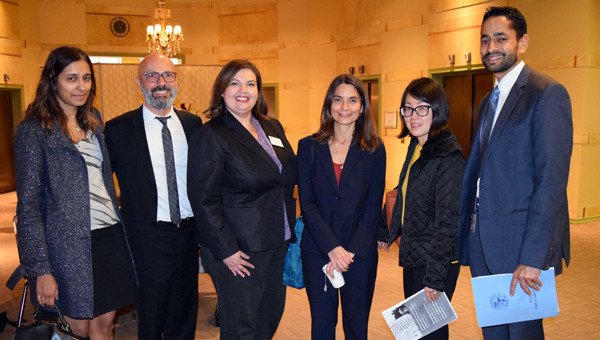SWLAW Blog | Community

March 8, 2017
On Shifting Sands: Immigration Under the New Administration
The panel discussion, “On Shifting Sands: Immigration under the New Administration” assembled on Tuesday evening at Southwestern to examine the fast-changing landscape of immigration policy under the Trump Administration. The panelists wasted little time in diving headlong into matters of considerable substance and urgency, but as the discussion began, Ameena Mirza Qazi, Executive Director of the National Lawyers Guild, was conspicuously absent.
In his introductory remarks, Anuj Gupta, General Council in Immigration Affairs to Mayor Garcetti, provided a window into an administration working tirelessly to find its footing amid a shifting landscape of unorthodox executive orders, sanctuary policies, and what he considered ICE overreach. He lauded the LAPD for “their progressive approach towards immigration,” citing their implementation and upholding of Special Order 40, increasing denial of incoming ICE detainer requests, and refusal to participate in ICE’s controversial 287G program. He detailed a number of programs being spearheaded by the Garcetti office, including the LA Justice Fund, an initiative proposed to provide legal assistance for residents facing deportation.
One senses that Gupta had only begun scratching the tip of the iceberg, when Moderator Bruce Einhorn, Executive Director and CEO of The Asylum Project, interjected:
“This is my subtle way of subtly informing you that you’re about out of time.” Einhorn’s subtlety was met with laughter.
Qazi arrived shortly after Gupta concluded. Texting furiously, she took her seat in the panel.
Shui Ming Cheer, Senior Staff Attorney & Field Coordinator of the National Immigration Law Center, detailed key aspects of the shift in deportation policy and priority from the administration of Barack Obama, to that of our current president. While Obama’s office largely concerned themselves with convicted criminals, President Trump has expanded this umbrella to encompass any undocumented residents with arrest records or chargeable offenses. Under such standards, an infraction such as a speeding ticket can result in one being deemed a priority for deportation. Cheer gave detailed advice on specific actions to empower communities and individuals to prepare for and push back against ICE raids, and explained how her organization is working to create Rapid Response networks to monitor ICE, generate information on raids, and help locate and offer representation to those who are detained.
“On the subject of rapid response” began Qazi, whose attention was still noticeably divided between her audience and her work, “a father of two was detained on Aliso and Alameda while dropping his two daughters off at school.” She finished her text, withdrew from her phone, and announced to the crowd that “In the next 40 minutes, we’ll know what these children’s lives will be like. If they’ll have a father to take them to school every morning.” Perceivably shaken, Qazi railed against what she deemed the prejudicial and “patently racist” immigration policies of the current president and implored the audience to commit themselves to “systemic, intersectional change” in the way we treat immigration in the United States.
Approaching the tail-end the Q&A portion of the evening, wherein panelists were posed a variety of difficult questions ranging from “What will Trump’s next iteration of his Travel Ban look like?” to “How should communities deal with predatory notarios?” to “Should the LA Justice Fund include carve-outs?”, Qazi announced that the detained father was granted a stay by the 9th Circuit Court of Appeals. She noted that “this is not the end. Our work isn’t over.”